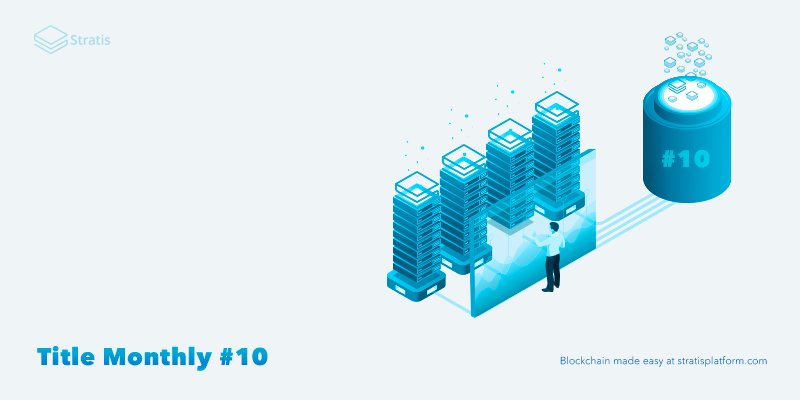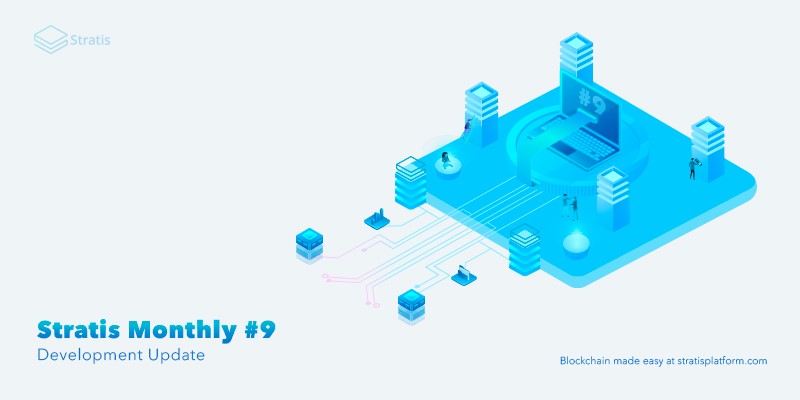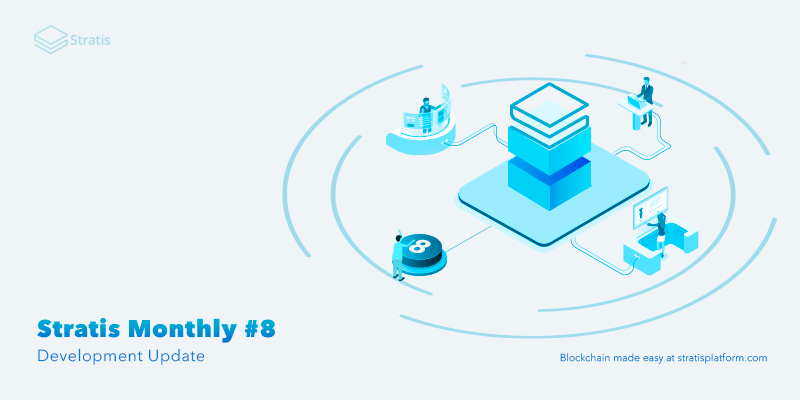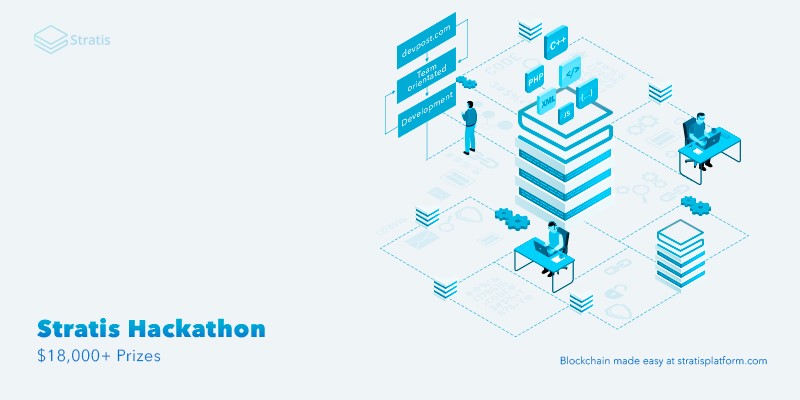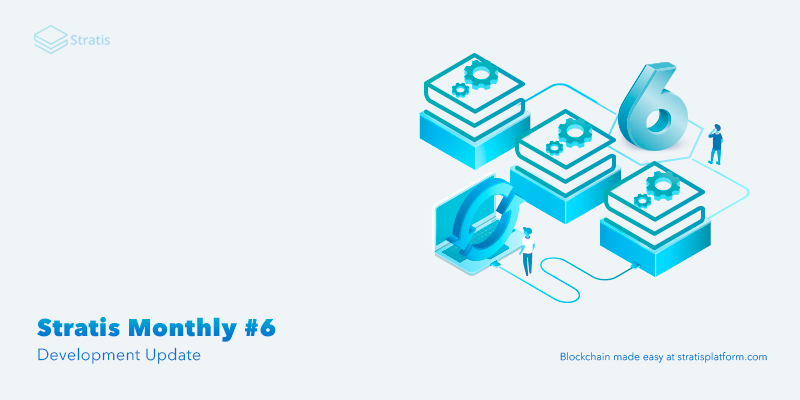The primary development focus during October was exchange readiness and preparation for the Stratis Hackathon hosted on Devpost. The hackathon has received attention from a number of established hackathon contestants and we expect the number to increase throughout the coming weeks.
Development Update
A high-level summary of the key developments can be found below.
Stratis Full Node
- Improved mempool handling of dust transactions
- Increased wallet security by removing password caching logic
- Stabilised various integration tests with regards to sidechain operations
- Refactored database locking
- Improved reliability of the PoA miner resulting in the avoidance of missing blocks
- Aligned RPC methods with Bitcoin Core 0.18
- Greatly improved RPC Response times.
Wallet
- Improved performance of the SQL Wallet
- User-Interface updates to the support SQL Wallet
- Testing and stabilising the SQLite Wallet integration
- Optimization of the Wallet Feature
- Bi-directional alignment of unconfirmed wallet transactions
- Improved the performance of console updates for the wallet
- Added improvements and features to the hackathon wallet
- Improvements for token management screen in Cirrus wallet
Sidechains
- Implemented improved network rule registration across the Cirrus networks
- Improved transaction history for Cirrus Core
- Various fixes and improvements with regards to cross-chain transfers on Cirrus
Smart Contracts
- Performance improvements for smart contract execution via caching
- Updated smart contracts tutorial for latest full node release
Roadmap Update
The development focus this year was to continue enhancing the Stratis Platform, incorporating new features as detailed on the Stratis 2019 Roadmap.
These features play a key role in Stratis being an attractive viable option for developers and organisations blockchain needs.
It is crucial for us to remain agile and actively develop solutions that bring a significant benefit to the platform. This has resulted in a number of key items being prioritised over items listed on the Stratis 2019 Roadmap.
Development efforts have been shifted to deliver alternative technologies that will bring further value to the Stratis Platform, as an example, the Segregated Witness (SegWit) development on Stratis is now code complete and is due to undergo our rigorous test cases to ensure compatibility within a heterogenous environment. SegWit facilitates the future scalability of the Stratis blockchain by giving an effective increase to the size of the blocks permitted on the network.
Furthermore, it opens the possibility of improvements to the transaction scripting language. This means that functionality that may previously have required a hard fork can now be implemented safely on the network. It also lays the groundwork for technologies such as Schnorr signatures and Merkelized Abstract Syntax Trees (MAST), that can again be leveraged to gain scalability benefits.
The implementation of the Breeze Privacy Protocol also becomes achievable with the activation of SegWit on Stratis Mainnet. We expect the Breeze Privacy Protocol functionality to be the first delivery of extended functionality once SegWit is activated by majority of block producers move to a SegWit supported node.
In addition, further development and refactoring of the Stratis Full Node to ensure like-for-like response times (in comparison to StratisX) when interrogating the node via Remote Procedural Call was a significant focus. Along with the complete re-development of the Stratis Full Node Wallet Feature, to significantly amplify the ability to scale and ensure data integrity. This ultimately provides current and future exchanges and third-parties the ability to utilise the Stratis Full Node as opposed to our legacy node that is currently leveraged.
Distributed Ledger Technology (DLT) has also received considerable attention, the further development includes the integration of a Certificate Authority and end-to-end encryption allowing private blockchain implementations to remain private and secure. The addition of memberships services and ‘token-less’ support for the Proof-of-Authority Consensus Algorithm are also additional features that have been incorporated into our DLT offering.
These additional developments have not drawn the focus away from all items listed on the Stratis 2019 Roadmap. You can expect a significant number of deliverables to be released prior to the close of the year.
A brief summary of the Stratis 2019 Roadmap can be found below:
Stratis Payment Gateway
We have been working closely with MediConnect to understand their business requirements and assisting them with both documenting and designing the Payment Gateway infrastructure. As we move into 2020 we will continue to liaise with MediConnect to provide a functional Payment Gateway that can be repurposed for similar use-cases.
Stratis STO Platform
The Stratis STO Platform has received significant attention to cater for the upcoming Gluon Security Token Offering (STO). Requirements have been fed directly from the U.S Security Exchanges Commission (SEC) as part of Gluon’s application, ensuring the platform meets the needs of an approved Security Token Offering.
Stratis Mobile Wallet
Development is being undertaken to make a mobile wallet available, the current focus is on porting an already established Mobile Wallet Service to support a Proof-of-Stake network and the Stratis networks, including Stratis and Cirrus.
Unity SDK
A Unity plugin has been a focus for 2019, we have successfully tested NStratis in Unity, however, a full production release of a Unity plugin will not be available until next year.
Stratis Sidechain Masternodes
The development of the Stratis Sidechain Masternodes to support the Cirrus Sidechain was a major development for Stratis in 2019. Currently all block producers on the Cirrus Sidechain are publicly operated Stratis Sidechain Masternodes, maintained by holders of the Stratis Token who meet the collateral requirements.
Breeze Privacy Protocol
The integration of the Breeze Privacy Protocol becomes possible with the implementation of SegWit, initial designs focused on integrating the Privacy Protocol being implemented natively, however, with the introduction of SegWit, it makes this integration possible with a significantly lowered network disruption.
Java & JavaScipt Support
An intermediary service supporting other programming languages is a development that will attract developers with expertise outside of the .NET ecosystem. The integration of JavaScript support is heavily tied with the Mobile Wallet deliverable.
Proof-of-Stake Sidechains
A design has been in place for Proof-of-Stake Sidechains, however, this development requires a significant amount of focus and resources were allocated to other important aspects of the business. As a result, the design will be re-assessed in the coming year.
Stratis Core 2.0
The makeover of Stratis Core is underway, focusing on providing a new User Experience (UX) whilst catering for further developments and integrations into the desktop wallet.
Since the conception of the Stratis Core User-Interface the developments of the Stratis Platform have changed dramatically, meaning there are more features to incorporate in the GUI (Graphical User Interface). A change of design was the best way forward to ensure that all these new features have a home without impacting the user experience.
As we move into next year, the focus for private distributed solutions will grow significantly to accommodate business adoption within the private sector whilst also catering for those who wish to utilise a public network with an associated cryptocurrency.
Stratis Smart Contracts Hackathon underway!
It’s an exciting month for Stratis and developers with the start of the Stratis Smart Contracts Challenge. The Stratis Hackathon will run for six weeks until 16 December 2019 and you can enter now for the chance to win up to US$10,000 for first place with a total of US$18,000 up for grabs. Just go to our Devpost page and follow the instructions to enter.
The hackathon is part of the Stratis Academy initiative to reduce barriers to entry for developers entering the blockchain space. As a result, significant effort has been put into simplifying the set-up process to make it as easy as possible for both new and existing developers to get started in a ‘click and play’ environment. Entrants can find a full tutorial, including instructions and examples, on the Stratis Academy website.
We are grateful to C# Corner for their sponsorship of the event and to our judging panel, which includes developers, blockchain gurus and Microsoft MVPs. Already, over 35 participants have signed up to take part and we’re very excited to see the new and innovative applications of Stratis Smart Contracts in C# that emerge from the hackathon. Watch this space!
Partner update – Gluon moves forward with SEC submission and grows fuel industry product, Petromo
Gluon has been making headway with its registration with the U.S. Securities and Exchange Commission (SEC). Having begun the registration process last year, Gluon is now in the later stages of the procedure. Stratis is working closely with Gluon to assist with the submission process so that Gluon can begin its token offering.
The business is also developing positively. Petromo, Gluon’s enterprise product which monitors fuel inventory, is expected to expand its footprint in the U.S. from 40 live locations to over 400 by the end of Q1 2020. Built for the widely used Gilbarco Veeder-Root system, Petromo’s IoT hardware allows users to monitor their fuel inventory remotely on their mobile devices. It is currently monitoring 4 million gallons of fuel per month at its 40 live business locations.
Gluon has also received approval from Gilbarco for the development of a third-party backend office system which will also be a part of the Gluon platform.
Stratis has been working with Gluon since January 2018. Gluon’s technology platform establishes a secure network of interconnected vehicles, allowing users to diagnose, track and monitor issues using IoT devices, AI and blockchain.
Partner update – MEDI distribution process begins
It’s been just over four weeks since MediConnect closed its ICO, raising 432,685.64 STRAT and 104.33 BTC for its pharmaceutical solution to protect patients both on and offline.
Participants in the ICO are now being asked to create a Cirrus Core Wallet address and submit it to the ICO platform. This will allow the token distribution to run smoothly and efficiently. Detailed instructions are provided on MediConnect’s website.
Stratis in the news
Stratis continues to feature in the news as our CEO, Chris Trew, authored an article in Crypto Globe on Why Blockchain Will Be One of History’s Key Technologies. In the piece, Chris suggests blockchain can have a similar far-reaching impact as the other great technological leaps in history and help to define the ‘Fourth Industrial Revolution’.


